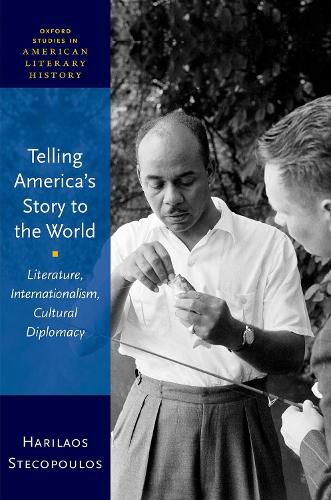Readings Newsletter
Become a Readings Member to make your shopping experience even easier.
Sign in or sign up for free!
You’re not far away from qualifying for FREE standard shipping within Australia
You’ve qualified for FREE standard shipping within Australia
The cart is loading…






Telling America’s Story to the World argues that state and state-affiliated cultural diplomacy contributed to the making of postwar US literature. Highlighting the role of liberal internationalism in US cultural outreach, Harilaos Stecopoulos contends that the state mainly sent authors like Ralph Ellison, Robert Frost, William Faulkner, Langston Hughes, and Maxine Hong Kingston overseas not just to demonstrate the achievements of US civilization but also to broadcast an American commitment to international cross-cultural connection. Those writers-cum-ambassadors may not have helped the state achieve its propaganda goals-indeed, this rarely proved the case-but they did find their assignments an opportunity to ponder the international meanings and possibilities of US literature. For many of those figures, courting foreign publics inspired a reevaluation of the scope and form of their own literary projects. Testifying to the inadvertent yet integral role of cultural diplomacy in the worlding of US letters, works like The Mansion (1959), Life Studies (1959), Cultural Exchange (1961, 1967), Tripmaster Monkey: His Fake Book (1989), and Three Days Before the Shooting… (2010) reimagine US literature in a mobile, global, and distinctly political register.
$9.00 standard shipping within Australia
FREE standard shipping within Australia for orders over $100.00
Express & International shipping calculated at checkout
Telling America’s Story to the World argues that state and state-affiliated cultural diplomacy contributed to the making of postwar US literature. Highlighting the role of liberal internationalism in US cultural outreach, Harilaos Stecopoulos contends that the state mainly sent authors like Ralph Ellison, Robert Frost, William Faulkner, Langston Hughes, and Maxine Hong Kingston overseas not just to demonstrate the achievements of US civilization but also to broadcast an American commitment to international cross-cultural connection. Those writers-cum-ambassadors may not have helped the state achieve its propaganda goals-indeed, this rarely proved the case-but they did find their assignments an opportunity to ponder the international meanings and possibilities of US literature. For many of those figures, courting foreign publics inspired a reevaluation of the scope and form of their own literary projects. Testifying to the inadvertent yet integral role of cultural diplomacy in the worlding of US letters, works like The Mansion (1959), Life Studies (1959), Cultural Exchange (1961, 1967), Tripmaster Monkey: His Fake Book (1989), and Three Days Before the Shooting… (2010) reimagine US literature in a mobile, global, and distinctly political register.